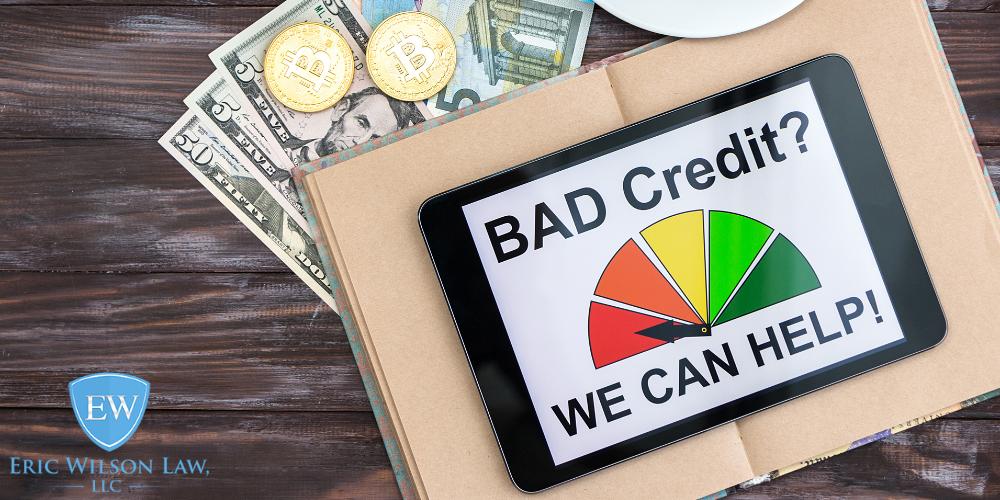Facing bankruptcy is terrifying for most people. They may have several questions running through their minds, like: will bankruptcy really wipe out all my existing debt? Will bankruptcy have a negative impact on my credit, and if so, how soon will my credit score improve after bankruptcy?
The truth is that bankruptcy can definitely tank people’s credit scores. But in most cases, these people already have a bad credit score because of how much debt they have. In fact, the average credit score after a bankruptcy discharge can vary between 400 and 530. The good news is that you can build credit within a short period of time, even after filing for bankruptcy. Below, our legal team discusses how bankruptcy will affect your credit, how soon you can boost your credit score after bankruptcy, and the best ways to boost your credit.
If you’re crushed under the weight of credit card debt, medical debt, student loan debt, or tax debt, there is hope. Eric Wilson has been helping the people of Tuscaloosa, AL achieve financial freedom and stability for more than 25 years. He can help you too. Call 205-349-1280 to schedule a free consultation today.
How Does Bankruptcy Affect Credit?
Many people think that filing for bankruptcy is the end of the world and something that will destroy their credit scores forever. Obviously, filing bankruptcy is not ideal for anyone. But it’s often the best possible solution to wipe out all (or most) existing debt in a short amount of time. And yes, a bankruptcy filing can take a huge hit to your credit. But chances are, if you had enough debt to file bankruptcy, your credit likely wasn’t looking good anyway.
As a general rule of thumb – the higher your credit score was before your bankruptcy filing, the more it will drop after your bankruptcy filing. For example, if your FICO score is between the “good” and “excellent” ranges, you can expect your credit score to drop as many as 200 points after filing for Chapter 7 or Chapter 13 bankruptcy. If your FICO score is between the “poor” and “fair” ranges, your score may drop by around 150 points. It all depends on your credit, your debt, and the type of bankruptcy you file.
How Long Does a Bankruptcy Filing Stay on Your Credit Report?
You can expect a bankruptcy filing to stay on your credit history for 7 to 10 years after your final discharge, depending on the chapter of bankruptcy you file. You cannot remove bankruptcy from your credit history unless there is an obvious error of some sort.
Having a bankruptcy filing on your credit report can affect your financial situation in a variety of ways. For example, credit card companies may be more hesitant to work with you, it may be more difficult to get loans (car loans, home mortgage loans, personal loans, etc.), it may be difficult to get a high credit limit or a low interest rate on a credit card, and it may even be difficult to get an apartment.

How Soon Will My Credit Score Improve After Bankruptcy?
If you’re reading this and immediately feeling defeated or hopeless about eternal bad credit – don’t! Just because bankruptcy sticks around that long does not mean you can’t start fixing your credit score and seeing improvement before the 7 year mark. It also doesn’t mean that you can’t obtain credit or a car loan, it just means you might struggle more to do so.
In fact, most people can improve their credit score significantly within 1 to 2 years of filing bankruptcy. You may need lots of professional help and guidance to do this, but that’s okay. Eric Wilson has been helping his clients pay off their debt and rebuild their credit after bankruptcy for decades. He can help you too.
How to Rebuild Credit After Bankruptcy
Listed below are the best ways to work towards a good credit score after filing for Chapter 7 or Chapter 13 bankruptcy. If you need one-on-one, professional support during this process, don’t hesitate to reach out to Tuscaloosa bankruptcy lawyer Eric Wilson.
Stick to a Budget
First thing’s first: sticking to a strict budget is crucial for maintaining financial responsibility, especially after bankruptcy. The last thing you want to do is accrue more debt through reckless spending habits while you’re trying to recover. Make sure you allocate enough money to all of your important bills (and any left over debt payments) as well as an emergency fund. We know that life happens, but still, try to stay within budget limits as much as possible.
Make Timely Payments
Did you know that payment history accounts for about 35% of your credit score? That’s right. So the best thing you can do to rebuild credit is to make on time payments every single month. If making timely payments is a struggle for you due to poor memory or just the busyness of daily life, make a reminder about each monthly payment in your phone or turn on autopay for the bills you tend to forget, such as utility bills.
Just like bankruptcy can stay on your credit report for a minimum of 7 years, so can late payments. Having both a bankruptcy filing and one or more late payments on your credit report looks bad to credit card issuers and other lenders. Not only that, but your credit score will continue to suffer. So if there’s one thing you need to focus on for credit recovery, it’s on time payments.
Open a New Account
Getting approved for any kind of new credit after bankruptcy can be a struggle, to say the least. But it’s not impossible, and it’s another crucial part of boosting your credit score.
Your best options right now in this recovery phase are to apply for a credit builder loan or credit card or ask a loved one to become an authorized user on one of their credit cards.
Credit builder loans are often available with an affordable interest rate at community banks and credit unions. If you have some money to spare, you could borrow up to $1,000 for a credit builder loan and pay it off in a timely manner. Doing this can boost your credit score by several points in a short period of time.
Getting a secured credit card may also be a good credit-building option. These types of credit cards work differently than normal credit cards – AKA unsecured credit cards. This is how it works: you pay a certain amount of money to a credit card issuer – say, $1,000 – as a security deposit. You’ll then receive a credit card with a credit limit of $1,000. If you make timely monthly payments, you’ll establish a solid credit history and boost your credit score.
Lastly, becoming an authorized user on a loved one’s credit card can be a good credit building option. Basically, you’ll be added to your loved one’s credit card account and “inherit” their good credit. Obviously, you’ll want to make this arrangement with someone who already has good financial behaviors. If your loved one has reckless spending habits, lots of credit card debt, and bad credit, your credit score will go down as a result.
Check Your Credit Report
Federal law states that all Americans have the right to request one free credit report copy from the three main credit bureaus (TransUnion, Experian, and Equifax) every year. This will allow you to check for and report any errors that could negatively affect your credit score. You can also check your credit score on a regular basis through sites like CreditKarma so that you can monitor your credit repair progress.

Call a Tuscaloosa Bankruptcy Lawyer at Eric Wilson Law Today
If you have filed bankruptcy within the last few years and you need help rebuilding credit, reach out to Tuscaloosa bankruptcy attorney Eric Wilson. Not only does he have decades of experience in helping his clients with debt repayment methods, but he also has what it takes to help his clients fix their credit reports. Call 205-349-1280 to schedule a free consultation at his law office today.


